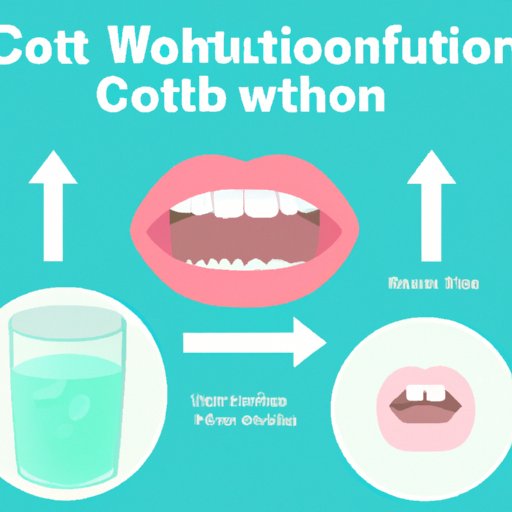
Introduction
Cotton mouth, also known as dry mouth, is a condition that occurs when your mouth does not produce enough saliva. Saliva plays a crucial role in keeping your mouth moist and healthy, protecting your teeth from decay and helping you digest food. When you do not have enough saliva, you may experience symptoms such as a dry, sticky feeling in your mouth, bad breath, difficulty swallowing, and an increased risk of oral infections.
Keeping your mouth hydrated is essential to your overall oral health. Without enough saliva, you may experience discomfort, pain, and other oral health issues. In this article, we will explore some tips and tricks to help you get rid of cotton mouth and keep your mouth healthy.
The Importance of Hydration
Cotton mouth affects not only your mouth but also your entire body. When you do not have enough saliva, you may experience difficulty eating and speaking. The lack of saliva also makes it easier for bacteria to grow in your mouth, which can cause cavities, gum disease, and other oral infections.
Drinking enough water is essential to keeping your mouth hydrated. It is recommended that you drink at least 8-10 glasses of water daily to maintain good oral health. You can also increase your water intake by adding sliced fruits and vegetables to your water or drinking herbal teas.
Other ways to promote hydration include limiting your alcohol and caffeine intake. Both alcohol and caffeine can dehydrate you, leading to cotton mouth and other health issues. Additionally, smoking can also contribute to dry mouth, so quitting smoking can help improve your oral health.
Using Mouthwash
Mouthwash can be an effective way to combat dry mouth. Mouthwash contains ingredients that help to promote saliva production and keep your mouth moist. However, not all mouthwashes are created equal.
Alcohol-free mouthwash with fluoride is the best option for those with cotton mouth. Alcohol can further dehydrate your mouth, making your symptoms worse. Fluoride helps to prevent cavities and strengthens your teeth, making it an essential addition to your oral care routine.
When using mouthwash, make sure to swish it around in your mouth for at least 30 seconds before spitting it out. It is best to use mouthwash after brushing your teeth to ensure that your mouth is clean and ready to receive the mouthwash’s benefits.
Sugarless Gum
Chewing gum can be a quick and easy way to increase your saliva production and combat dry mouth. However, it is important to choose sugarless gum to avoid promoting tooth decay.
Sugarless gum typically contains xylitol, which has been shown to help prevent cavities and promote saliva production. Chewing gum after meals can also help remove food particles from your teeth, reducing your risk for cavities and gum disease.
It is important to note that regular gum, even sugar-free gum with sugar alcohol, should be avoided. Sugar alcohol can actually contribute to cotton mouth symptoms, making it counterproductive.
Reducing Caffeine and Alcohol Intake
Caffeine and alcohol can cause dehydration, making your cotton mouth symptoms worse. These substances also contribute to dry mouth by inhibiting saliva production.
If you cannot eliminate caffeine and alcohol intake completely, try reducing your consumption. Consuming these beverages in moderation can help reduce your symptoms and improve your oral health.
Saliva Substitutes
If other methods are not working, saliva substitutes can help relieve cotton mouth symptoms. Saliva substitutes are products that mimic saliva in your mouth, providing moisture and lubrication to your oral tissues.
Saliva substitutes come in many forms, including sprays, lozenges, and gels. Some products may contain medications that help reduce inflammation or stimulate your saliva glands.
It is important to follow the product directions carefully to ensure that you are using the product correctly and safely.
Visit Your Dentist
If your cotton mouth persists despite trying these tips and tricks, it is time to visit your dentist. Your dentist can help determine the underlying cause of your symptoms and recommend appropriate treatment.
Your dentist may recommend medication, such as a prescription for a saliva stimulant, or refer you to a specialist. In some cases, your dentist may recommend lifestyle changes or other treatments to help manage your symptoms.
Conclusion
There are many ways to combat cotton mouth and improve your oral health. Drinking plenty of water, using alcohol-free mouthwash with fluoride, chewing sugarless gum, reducing caffeine and alcohol intake, and using saliva substitutes can all help relieve your symptoms.
It is essential to prioritize your oral health and seek medical attention if your cotton mouth persists. Your dentist can help determine the underlying cause of your symptoms and recommend appropriate treatment to keep your mouth healthy and comfortable.




